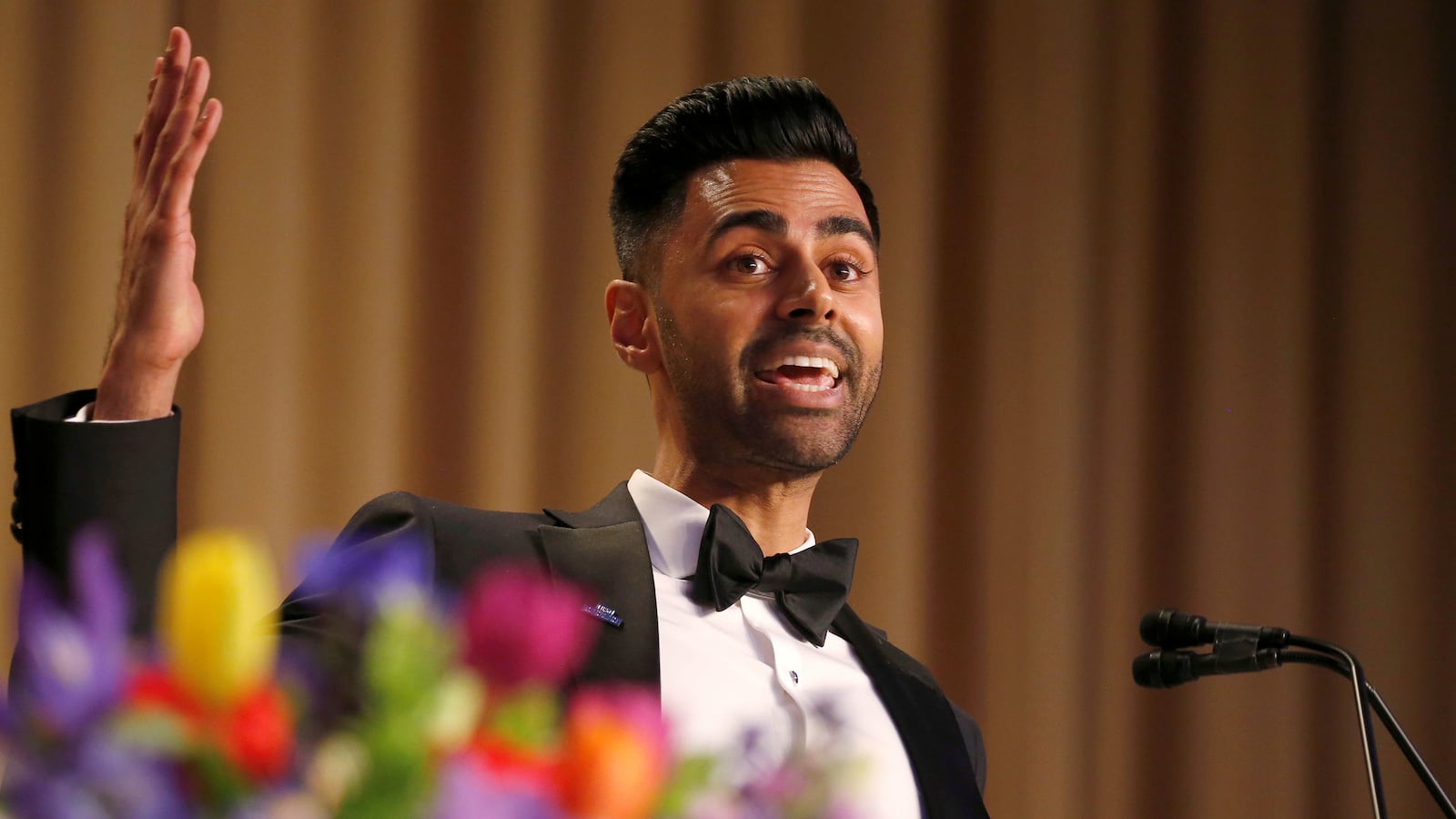“Guys... look at the lineup,” Hasan Minhaj tweeted Tuesday morning. “He’s definitely coming this year.”
The comedian and host of Netflix’s Patriot Act was sharing the news with his followers that after ditching comedy in 2019, the White House Correspondents’ Dinner is reversing course in a big way for 2020. In addition to tapping Minhaj, who hosted the event in 2017, as the evening’s “featured entertainer,” the White House Correspondents’ Association has also brought on Saturday Night Live star Kenan Thompson to host the Saturday night dinner on April 25.
The “he” in Minhaj’s tweet obviously refers to President Donald Trump, who has broken with precedent to skip the dinner altogether in each of his first three years in office. If he stayed away last year when the WHCA decided to appease him by hiring historian Ron Chernow to succeed Michelle Wolf’s devastating satire in 2018, there is zero chance he will show up this year for what could be his final chance as president.
The combination of Thompson and Minhaj appears on its face to be an attempt at balance by the press organization.
Thompson is by no means a conservative comic, but he does represent a broader, more crowd-pleasing brand of comedy. He’s more along the lines of figures like former SNL writer Conan O’Brien or his current castmate Cecily Strong, who both hosted the dinner during the Obama years, than he is like The Daily Show descendants Stephen Colbert, who delivered the most scathing routine in the dinner’s history to George W. Bush’s face, or Wolf, who most assumed would be the last Correspondents’ Dinner host.
The SNL factor also increases the likelihood that Alec Baldwin will make a surprise appearance in character as Trump during the dinner, something he has threatened to do in the past. Ahead of the 2017 dinner, Baldwin went on Jimmy Kimmel Live! to complain that the far superior Trump impersonator Anthony Atamanuik (of The President Show fame) was “lobbying” to replace the president, who had indicated he would not be showing up.
Then there is Minhaj, who will likely do the heaviest lifting on the political comedy front when he returns to the dinner.
As the first comedian to take on Trump at the dinner three years ago, Minhaj did not hold back. He called Steve Bannon a Nazi, Jeff Sessions a racist and went off on Trump for being too much of a coward to take a joke. Since then, he launched his own weekly show on Netflix, which has only sharpened his satirical skills. If he can go after Saudi Arabia for censoring his episode on Crown Prince Mohammed bin Salman’s regime, he can certainly roast the Trump administration (and the media) even harder than he did the first time.
When the WHCA first announced they would not be having a comedian host last year, comics were quick to criticize them for caving to Trump. As The Daily Show’s Roy Wood Jr. told me, it was a “sad day for jokes.” Michelle Wolf, who was accused of going “too far” with her jokes the previous year about Sarah Huckabee Sanders, called the organization “cowards,” adding, “The media is complicit. And I couldn’t be prouder.”
Late last year, I asked Wolf to elaborate on how she felt about the dinner ditching comedy. “I thought, good,” she said. “First of all, there’s no point in doing it if the president’s not going to be there. And roasts in general aren’t good if the home team’s not on board. The whole point of a roast is that everyone’s in on it. And this administration isn’t one that likes to be in on it. And honestly, they don’t deserve to be.”
“That’s how roasts work,” Wolf added. “And maybe that’s what the Correspondents’ Dinner used to be, but I think we’ve moved so far away from that and the relationship between the media and the White House has gotten so perverted that I don’t think they should have it at all. I was very happy to burn it down.”
There’s a reason Wolf’s jokes about Sanders landed harder than almost anything that comes out of the many late-night hosts’ mouths about the president and his allies on a nightly basis. Unlike her boss, Sanders was seated on the dais behind Wolf when she delivered her routine.
It was the same confrontational energy that made Colbert’s 2006 jokes at Bush’s expense so powerful. It’s what electrified the air in 2011 when both President Obama and Seth Meyers brutally mocked Donald Trump, who was seated at a table in front of them. Rumor has it, those jokes are what spurred Trump to finally run for president for real.
At its best, the White House Correspondents’ Dinner can be both a roast where “everyone’s in on it” and, at the same time, a chance to speak truth to power in a room where not everyone wants to hear that truth. Until America elects a president who can take a joke, it will remain—in the words of former Obama speechwriter Jon Lovett—a “zombie custom for a zombie relationship with a zombie White House out of respect for zombie norms our zombie president doesn’t give a shit about.”
For more, listen and subscribe to The Last Laugh podcast.







